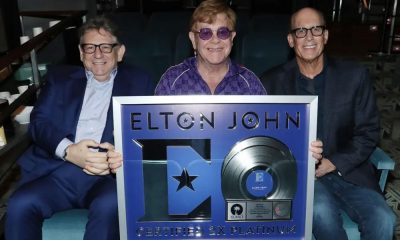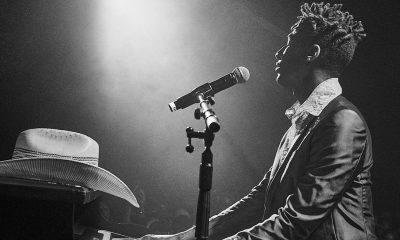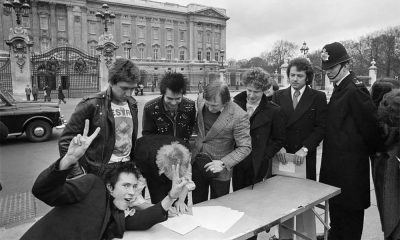News
Anne Murray Interview: The Legendary Singer Reflects On Her Life And Career


Thanks to a long string of hits, including her million-selling “Snowbird” (1970) and Grammy-winning “You Needed Me” (1978), singer Anne Murray became an international superstar. But success wasn’t always sweet. A new documentary, Anne Murray: Full Circle, reveals that, even early on, Murray felt the prices of fame – most notably, the time away from family – were too high.
In a rare interview promoting the film’s stateside release, Murray reflected on a life that has come full circle to her home in the Canadian province of Nova Scotia.
Buy or stream Anne Murray’s The Ultimate Christmas Collection.
Most of the material in Full Circle was addressed candidly in your 2009 autobiography, All of Me. Why agree to participate in the movie?
Well, my manager, Bruce Allen, had been talking about this for a long time. He said, “I think that we should do a documentary about your career.” And, by that time, I had been retired for a long time [since 2008] and sort of forgot what I did for a living. And he went about searching and looking for someone who might want to do this kind of thing, and the network [CBC] was right there, and it all kind of fell into place very nicely.
One big thing that separates this from other docs is how much source material the filmmakers had on you, both at work and at home.
I had my daughter Dawn [Langstroth] go through all of the film and videos and everything that my husband took, because he was never without a camera in his hand. He took videos of every kind, and he took stills. And, so, we had that at our disposal, and we had never shared that before because it was personal. We really didn’t think to share it. It was for us. So, she went through all of that stuff and put it on her drives for the documentary people. And they just did a wonderful job of putting it all together. It was a lot of work for her.
Very quickly, the film lets us know that time away from home was hard on you from the start, later for your children, and probably cost you your marriage. Being a hit machine wasn’t all roses and sunshine.
No, it certainly wasn’t. And for my daughter, Dawn, it was really it was tough to go back there and see all of those pictures. And, as a matter of fact, she didn’t even want to watch the documentary. She had to get her courage up to watch it. But this amazed me: She loved it. I’d already been down this road with the book. People always say these things are cathartic, but I just find them really hard to do. And this was another one of those revisits that I wasn’t sure about doing. But once we got going, I realized I was working with such a great crew of people who were really dedicated to me to making this a real classy thing. So, it got rolling, and we just kept doing it until it was finished.
Let’s move to the music. It makes sense to start with your breakthrough single, the story of “Snowbird.”
Gene MacLellan was the writer of “Snowbird,” and he showed up to do a guest appearance on a television show, Singalong Jubilee. And [Murray’s future husband] Bill Langstroth was the producer-director on the show, and he introduced me to Gene. Bill said, “You’ve got to hear these songs. They’re so good.” So, Gene came up to a conference room when he sat there with his guitar, and he brought this little tape, and he sat and played. I was so taken with his singing, and I was so taken with “Snowbird.” And I said, “Well, would it be OK if I took those songs and learned them?” And he said, “Oh, yes. Sure, you can have them. So, I walked out of the room with a tape in my hand.”
With “Snowbird,” you became the first Canadian female solo singer to earn a gold single for a million copies sold in the United States.
Well, it changed my life. It was so exciting. I can still remember watching the charts and, all of a sudden, it was No. 45 with a bullet. [It would peak at No. 8 on the Billboard Hot 100.] And here I was in Nova Scotia, for heaven’s sake, so far removed from anything show business. And there it was, climbing up the charts. And then, I was in New York City doing these interviews. I didn’t know what hit me. It was just a whirlwind. I didn’t know what I was doing for about three years.
“Snowbird” also set you up to become the first major Canadian female solo country star in the U.S. – paving the way for Shania, k.d., Terri Clark, and others. But you were initially unhappy about the “country” label.
I didn’t want to be pigeonholed early on in my career as a specific kind of singer. Now, as far as going to Nashville after “Snowbird” was a hit, I seemed to be welcomed with open arms there. All the ladies, Merle Haggard, all of those people, were so nice to me and so kind to me. It turns out that the country audience was my biggest audience, and I’m most grateful to them for accepting me when I was the one who was a bit reluctant in the beginning.
After “Snowbird,” the hits kept coming in Canada. But it would take two-and-a-half years for you to return to the pop top 10 in the U.S. What were you thinking at that time?
Well, it was one of those things where we didn’t know what to do because we had given Capitol Records “Put Your Hand in the Hand.” I had recorded it. It was a Gene MacLellan song, and so was “Snowbird.” And I just thought, “Perfect, perfect follow up.” But the powers that be at Capitol at the time said, no, it wasn’t. I thought they knew what they were doing. I found out they didn’t. [While Murray’s version of the “Put Your Hand…” sat on her album, Canadian band Ocean took the song to No. 2 on the U.S. pop charts in 1971.] And, so, we had to search around, scrambled, and we found “Danny’s Song” on a Loggins and Messina album. And we just said, “Let’s record it.” And, before we knew it, it was getting all kinds of airplay and, so, yeah, that kind of kept things moving for a while. And then “Love Song” came, which was another Kenny Loggins song, and “You Won’t See Me.”
Enter John Lennon. It’s Thanksgiving 1973. You’re playing The Troubadour in West Hollywood, and then comes The Photo. It’s you, Lennon, Harry Nilsson, Alice Cooper, and Mickey Dolenz – The Hollywood Vampires.
Shep Gordon, who was managing me at the time, also managed Alice Cooper, and they were all there. And I can assure you that I was the only sober one in that picture that was taken. But they were having a good time, and they came. They came to see the show. I don’t know how long they stayed or what, but I do know that we got that iconic picture done, and I’ve gotten a lot of mileage out of it.
You would meet up with Lennon again, after your cover of The Beatles’ “You Won’t See Me” went into the U.S. pop top 10 in July 1974.
I was at the Grammys. And he came to my dressing-room door to tell me that he thought that my cover of “You Won’t See Me” was the best Beatles cover to that date. And I was thrilled because I was a Beatles freak. I loved them. And when he came to my door, I was speechless. It was a very good cover because it was so different from the original with that very original bassline that was happening in that record. It’s one of my favorite records.
Ironically, this is a career peak – and this is where the movie shows you at a breaking point.
Well, I was in denial in those early years. What I wanted to do was sing. And I don’t think I ever thought about all the stuff that you had to do in order to make a career. I never thought about that. I just thought, “I’m going to sing for people, and that’s that.” But then I found out it was really hard work, and you had to deal with a lot of different people, and so on. So when I talked to the press, and that was early days, I pretended that all those struggles weren’t happening. And I just said, “No, no, it’s no problem. I’ll do this.” And the other thing I used to say was, “If it doesn’t work out, I can always go back to teaching school.” And, so, what a joke that was. But really, deep down, I was struggling, as I think everyone does when they’re getting started.
“You Won’t See Me” would turn out to be a prophetic title. You wouldn’t return to the U.S. pop top 10 for four years with “You Needed Me.”
I was thinking about having children. I wanted to have children. And so that seemed to be the perfect time to get things going. And “You Needed Me” happened after the baby [William] was born [in 1976]. There were a bunch of tapes that I was listening to, and I had put it into a box that said, “Listen to it again” on it. And, so, I listened to it, pulled it out, and had to sit down because I was so taken aback by this song. And I obviously had listened to it before, but it didn’t hit me that time. This time it really hit me. I got right on the phone: “I can’t remember who to find out who wrote it. Could we put a hold on it?” And that was that.
I mean, I knew when we went in to record that song, you knew it was a hit. And everybody in the studio knew it was – all the musicians. Everybody knew. We were just, again, listening to this in the control room. However, it’s a ballad and ballads are difficult, and the record company was not keen. So, I had to go knock on doors. I had to go to the Capitol Tower in Los Angeles and talk to Don Zimmermann, who was the president at the time. And he said they had already started pressing another single. And I said, “Please, you have to go with me.” I begged him.
I had never even been involved in anything with Capitol Records or anything. I let my management people do that. But this time I went myself. I felt so strongly about that song. And he just said, “OK.” Right there. Got on the phone. I thought, “Wow, this is easy.” Now, it took a while for it to gain momentum on the charts. It was a long time on the charts going up, and it was slow going up and slow coming down. A lot of women bought that record. So, I can thank them for that.
Full Circle ends up spending more time on your personal journey than your professional journey. Was that always the plan?
In the beginning, I didn’t really know what form this would take because there were so many directions it could go. But it became very, very personal, and I didn’t expect that. I was expecting more of a career thing. But they wanted people to see the personal side and those struggles. And I’m glad they did, because it’s not easy for women in the music business. Now, I can’t say what it’s like today, but I know for me, it was very, very difficult in those days of kind of blazing trails and doing two shows a night in Las Vegas, and having children to go home to. It was really tough.
The film boasts an amazing list of big-name artists offering testimonials about your influence, and especially on your contributions to the Canadian music industry. I’m curious what Anne Murray hears when an Anne Murray record comes on.
Well, every now and then, I do go back and listen. And I have to remind myself that I was there. I’m always kind of surprised and pleased at, for instance, how good I was at choosing songs. I think I was a really good song picker. I think it was instinctive. I just knew. Of course, I had been listening to music since I can remember. And I listened to everybody. Everybody and everything. I don’t know whether it developed from that or what, but I always prided myself on being able to choose a good song. And I also pride myself on the fact that I sang them well. I did. And, so, what more is there to say, really? I mean, I’m patting myself on the back a bit. But, yeah, I did it well, and I did it as well as I possibly could.
This interview has been edited and condensed for clarity.
Buy or stream Anne Murray’s The Ultimate Christmas Collection.

-
Paul McCartney And Wings To Release Historic Live Album ‘One Hand Clapping’
-
Elton John Earns Multi-Platinum Plaque For ‘Diamonds,’ Shares ‘Step Into Christmas’ EP
-
Jon Batiste Announces ‘Uneasy Tour: Purifying The Airwaves For The People’
-
Best Political Punk Songs: 20 Essential Anti-Establishment Tirades





